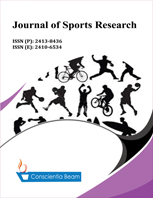Identity in Australia: A Case Study on the Role of Sport in the Ego Identity Formation Process
DOI:
https://doi.org/10.18488/journal.90/2016.3.2/90.2.56.72Abstract
This study explored how sport in Australia contributes to and informs the ego identity formation of an individual. A single female participant between the ages of 18 and 25 years participated in a series of interviews. The participant was selected on the basis of their chosen career path (i.e. PD/H/PE teaching) and their constant involvement in sport. Data collected from the interviews was analysed using grounded theory, principles of constant comparative analysis. Findings from the study indicate that identity is a single, multidimensional structure comprised of interrelated dimensions. In addition, further key findings indicate that sports act as a vehicle for individuals to ‘perform’ their identity to society. Through processes of self-enhancement and protection individuals protect their identity from threats, maintaining or enhancing the value placed upon it by others. Their choice of self-enhancement or protection and the consequent behaviour is determined by their self-concept (determined by social comparison) and societal values. The implications of this study lie with those in the education and sporting industries. Sport programs need to be positive, enjoyable and allow students to experience self-determination for optimal identity development and efficient function in society.

